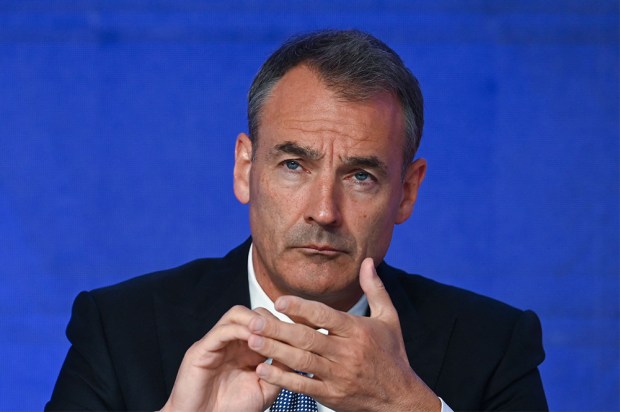Of all the stains on the reputation of UK banks, the PPI scandal is surely the most shameful, the most revealing of low human behaviour and the one with the most far-reaching consequences. Between 1990 and 2010, some 30 million customers were sold Payment Protection Insurance, supposedly designed to cover them if they became unable to make debt repayments; no one knows what proportion of those policies were ‘mis-sold’, but compensation has so far amounted to more than £36 billion, plus £12 billion of admin costs for the banks. As the final claims deadline approached last Thursday, Lloyds — the worst offender, with RBS in second place — was still receiving PPI-related calls at the rate of 190,000 a week.
The effect has been, first, to intensify the erosion of trust in banks and the wider financial services industry — while launching a cynical boom in claims soliciting, much of it based on nuisance phone calls and advertising that presented payouts as a potential lottery win for consumers who never realised they had bought PPI in the first place. Also eroded were the banks’ capacity to lend to business customers and to pay dividends to shareholders, including pension funds — while the flow of compensation payments, peaking at £6.3 billion in 2012, represented an unexpected economic boost that is now dribbling to an end. But that was also a shift of resources towards short-term consumer spending that might otherwise have contributed to long-term capital investment.
Car-dealers, conservatory builders and package-holiday providers will be among the biggest losers. Thousands of contract staff hired by banks to process PPI files will lose their jobs, as will some of the call-centre operatives who have plagued our phone lines over the past few years. But that, I fear, is one residue of PPI that won’t go away. The speculative claims industry is already turning its attention to payday loans, savings products, airline delays and medical issues — and you may be sure those maddening calls will never stop coming.
Thatcher in reverse
An FT series this week on the potential economic impacts of a Jeremy Corbyn government — the chances of which are creeping upwards — included this chilling quote from Momentum founder Jon Lansman: ‘We have to do what Thatcher did in reverse… We have to create a constituency of an awful lot of people with an obvious stake in a continuing Labour government.’ If that means a new generation of voters who think themselves better off as a result of government policies, there is a perverse congruence between the two revolutions in question.
Margaret Thatcher wanted to create a nation of homeowners, shareholders and business owners — and, of course, natural Tory voters — through a right to buy for council house tenants, mass offerings of privatisation shares and the encouragement of self-employment and small business. Corbyn and John McDonnell propose a right to buy for tenants of private landlords, fierce taxes on wealth, high incomes and corporate profits, and the expropriation of what the FT reckons to be £300 billion worth of shares in UK companies into an ‘Inclusive Ownership Fund’ which would be controlled by the Treasury but would pay fixed dividends to those companies’ workers.
Both those policy platforms represent radical redistributions of capital — but Thatcher’s was genuinely designed to improve voters’ lives and prospects, and in millions of cases it achieved just that. Labour’s is designed to penalise capitalism, at whatever cost, while (as Lansman’s words imply) making the mass of voters more dependent on the state. Of all possible outcomes of the current turmoil, never forget that the Corbyn-McDonnell option would be the ultimate catastrophe.
Trump’s harbinger
Much has been said about whether the recently deceased ‘fossil-fuel billionaire’ David Koch and his brother Charles were ultimately responsible for the triumph of Trump — despite a spat over trade tariffs (which the Kochs opposed) in which the President called the brothers ‘a total joke’. The argument is that the use on a colossal scale of the Kochs’ and other business owners’ ‘dark money’ to back right-wing causes and candidates has perverted US democracy and fertilised the harsh soil in which Trump’s support flourishes. But the path was cleared for him a generation ago by another corporate celebrity whose death this summer was far less noticed: Lee Iacocca, the battling executive who rescued Chrysler from the brink of bankruptcy.
Iacocca’s rants against Japanese incursions into the US car market, and the macho persona he projected in Chrysler television ads, won him such blue-collar popularity that he was urged to become a Democrat presidential candidate. In the end he didn’t, but pollsters believed if he had he might have beaten George Bush Sr in 1988 — and for better or worse, the idea was born that business braggadocio plus protectionist rage add up to the kind of statesmanship American voters admire.
Things can only get better
Back in Blighty after a month of French sunshine, I wish I could find good news on the home front. Sadly not. In the construction sector, new orders were at their lowest for a decade amid concerns ‘overwhelmingly attributed to domestic political uncertainty’, according to IHS Markit, which also reported factory activity contracting in August, for the fourth month in a row, to its lowest level since 2012; while the British Retail Consortium found August sales ‘flat-lining’ after a feeble 0.4 per cent growth over the past 12 months. But Spectator readers know that when the going gets tough, the consolation is lunch. So after a purging break while we all watch the news from Downing Street, I shall revert to my summer practice of offering — disguised in economic parables — regular value-for-money restaurant tips.
Got something to add? Join the discussion and comment below.
Get 10 issues for just $10
Subscribe to The Spectator Australia today for the next 10 magazine issues, plus full online access, for just $10.
You might disagree with half of it, but you’ll enjoy reading all of it. Try your first month for free, then just $2 a week for the remainder of your first year.















Comments
Don't miss out
Join the conversation with other Spectator Australia readers. Subscribe to leave a comment.
SUBSCRIBEAlready a subscriber? Log in